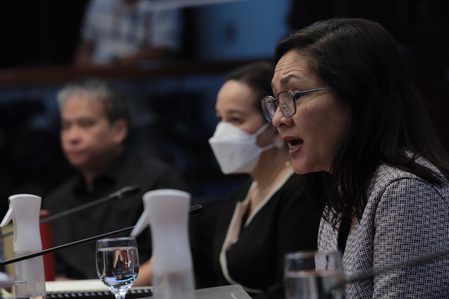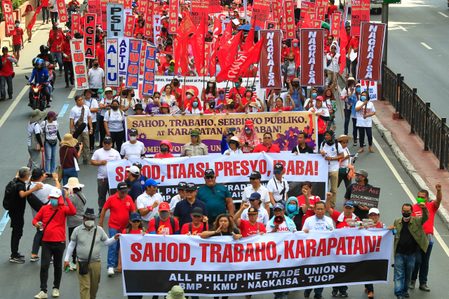SUMMARY
This is AI generated summarization, which may have errors. For context, always refer to the full article.
![[OPINION] Contemporary careers: On the difficulties of describing what you do for a living](https://www.rappler.com/tachyon/2023/11/imho-contemporarycareers.jpg)
In the summer of 2021, I was traveling with friends when we got pulled over at a quarantine checkpoint where the police inspected our travel documents. They asked about our jobs. My companions presented license cards to show that they’re medical doctors. When it was finally my turn, I froze. I was so flummoxed that my friends had to answer for me. “Researcher,” they said, while I sat silent, and we were let go.
It wasn’t true, however. I’m not a researcher.
That incident was an epiphany. It made me reconsider the path I have been pursuing in the past decade. Or that maybe there was no path, after all. I felt utterly alienated as I watched my friends fumble with their physician cards.
That summer, I acknowledged that I can’t name my job succinctly to save my life. I’ve become used to describing my job instead. And whenever I introduce myself as a program manager for education, I would leave disclaimers that I’m not a teacher, not a school administrator, and definitely not a researcher.
I realized too, that my answers differ depending on whoever asks. On random coffee dates, I say that I manage partnership projects. On official dinner receptions, I highlight that I promote research and internationalization of higher education. At the airport, scrutinized by an immigration officer, I answer with a long, technical chronicle description made complex with terms like transnational or scientific innovation; anything to distract their fastidious traffic measures. When my dentist asks, I just make ululating noises while in the chair, mouth agape. And when I’m too tired to explain myself, I just say I work in BGC and move on.
I also cannot easily describe my job to people around me. My family is an excellent litmus test for this; that is, if the cops asked my parents what I did for a living, they’d probably take an eternity to guess correctly, let alone describe my entire career. Friends are still clueless about it. Even colleagues from the same organization still ask me to explain what I do, as if to assure them I’m not a ghost employee. As if I have to prove again that yes, this job exists. It exists and I do it.
Another problem I have is that I recount my job description in piecemeal. I say that I chair some meetings on Wednesdays. I say that I publish reports quarterly. I say that on occasions I fly to Mindanao or Bangkok for annual training. Ironically, it would have been more convenient for me to narrate the intricacies of my tasks in the office rather than stating my title, rather than plainly saying that I’m a manager at the British Council.
Since I couldn’t decide on a simpler way to describe what I do, I have devised a segmented description of the very essence of my terms of reference. I start with the context of what my organization does and how our work spans wide, beyond the nationwide delivery of the IELTS exam. And that for the most part, we run programs for the arts, society, and education. Then I introduce the education projects and opportunities that I manage — for example, the Newton Agham Fund and the transnational education work we’ve been lobbying for. And finally, a mention of key stakeholders here and abroad — the government through the education and science sectors, universities, researchers, and students to name a few.
It’s a lungful. Taxing, and takes multiple sentences to get there, but it works.
Customised expertise
This whole definition of things has become difficult because my job is evolving expansively to meet the needs of the sector. One would argue this to be speculative, but the rapid global development underlines a truth to this supposition. Consider this: certain jobs today highly require skills and competencies that weren’t deemed essential a decade ago. The cloud computing specialists, social media managers, and professional game streamers are some of the most exciting, lucrative careers today. Futuristic as they may seem, these pioneering jobs thrive because the world demands for such specializations, and we’ve only done so recently as we recognize their role in nation-building. These were not jobs that my parents’ generation had. We respond to the needs of the time by building and updating ourselves on related specific skills.
The education sector consequently responds in a similar way. The Department of Education has evidently initiated this 21st century learning adaptability in the K to 12 basic education program. More adeptly, this latitude extends to technical and higher education. Case in point, TESDA, now offers courses on environmental literacy, Microsoft skills, SMART ICT, and English as medium of instruction. By expanding the list of free, accessible, and inclusive classes, the agency continues to give a fresh meaning to technical skills literacy.
Universities and colleges remain at the forefront of this revolution. Cosmetic Science is now offered at the Centro Escolar University, Esports is now a bachelor course at the Lyceum University, and the Animation degree at the De La Salle College of Saint Benilde is increasing in popularity.
I don’t have to go far to elaborate. My own Creative Writing degree from the University of the Philippines has already led me to workspaces that are not readily found in a roadmap for someone who majored in fiction and poetry. And yet, my alma mater also continues to learn as an institution. Just recently, I’ve been surveyed by the department to “ensure that the program is aligned with the needs of its students and remains relevant today.” This is institutional adaptability.
The list goes on, and so are the career possibilities for learners. Chances are that these courses and research interests would call for far more intricate jobs. Some of these careers will be called by indefinite nomenclatures — the officers, the managers, or consultants, or freelancers — those whose roles are open to changes and variables. Some will be complex enough that they needn’t be defined in single terms.
Building insight from the unresolved
This goes back to my job that I can’t seem to name. As education manager, I administer scholarships and research opportunities for young Filipinos. We’ve since been running projects to support the pursuit of novel interests such as robotics in neurorehabilitation, wireless sensor networks, or designing education. Additionally, we also work with Philippine universities in building new international courses like those in disability studies and biomedical engineering.
Through my work, I see a promise of a bright and unique career outlook fit for the time and place I live in now. And if you personally know me, you might have heard me say this: how the British Council has largely influenced my career specialisms chiseled by the evolution of my functions and the training opportunities I’ve been given the past six years. Moreso, I feel proud that my work ethic is cast by a particular goal to live up to the organization’s fundamental values — inclusive, optimistic, and open to a commitment of service.
Maybe this is what I should dwell on, not about finding an unchanging name for my dynamic job. Perhaps I should instead reflect on my relationship with my profession, and if I haven’t paid enough attention to its intricacies — from the joys and comforts to the immense weight of burnout. Have I become more mindful of the positive impact of my work? Have I deferred to stability and maybe failed to pay attention?
David Foster Wallace weighed the same in his 2005 speech at Kenyon College. He challenged his audience to grow a little awareness, to be conscious about day-to-day life experiences, and in the process, maybe learn to construct meaning from things that really matter. Do I keep pursuing a job title that is outgrown by the job it wants to describe? By the very words that define it? I’ve time and again questioned this myself, though I’m sure I need to cross a different checkpoint to give myself an answer. – Rappler.com
Danie Son Gonzalvo is the Education Manager at the British Council. He was previously a literature teacher. He also took part in the K to 12 education transition through his work in materials development and teacher training.
Add a comment
How does this make you feel?







There are no comments yet. Add your comment to start the conversation.